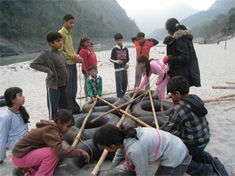Projects Systems Thinking in Schools
Disha India is working on integrating systems thinking principles and habits in the school curriculum and pedagogy.
Systemic thinking is a discipline of seeing relationships and patterns rather than static snapshots and events. It is about seeing how one's thinking affects structure and reality. Actually, it is about seeing our own connections to what is happening in the real world and finding a leverage for change and growth.
The ability to act depends on our ability to think and our ability to think depends on our ability to see. Therefore, what we see in life is important. Developing our ability to see things systemically empowers us to act effectively and responsibly.
We generally tend to react to events. If we are able to see the pattern of events and how they change overtime then we try to adapt to the situation. If we are are able to

see the underlying structure i.e. inter- relationships among parts and how parts affect each other, that enable us to re-structure parts and their relationships, leading to new patterns and events. The ability to see the underlying assumptions/beliefs/mental models behind the structure enable us to understand our limiting thoughts and reworking on them, which leads to the generation of new structure and therefore change in patterns and events. The more systemic we are in our approach, the more effective is the change.
According to the science of systems dynamics, the structure of the system determines its behaviour. How we structure the teaching and learning in a school determines the learning outcomes that we get. The structure comprises of parts of the system, the inter-relationships among the parts, how the parts influence

each other and the underlying assumptions on which the whole structure is based. The systemic assumptions about how children learn are important in defining the structures and processes in a school, which in turn determines the learning outcomes that we get. Therefore, to re-invent schools we need to understand, question and redefine learning structures and the underlying assumptions on which they are based.
Disha India's work in systems thinking is inspired and informed by the tools and practices of Water Foundation, USA and Peter Senge.
To know more about the habits of a system thinker, please download the




